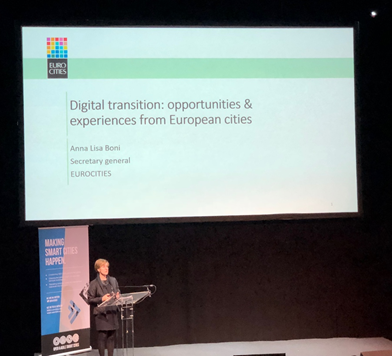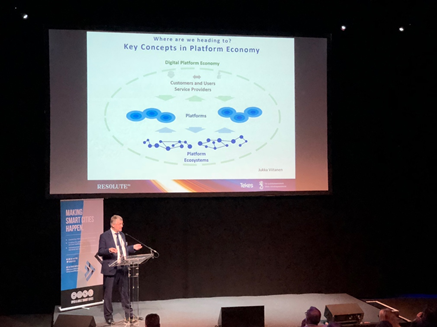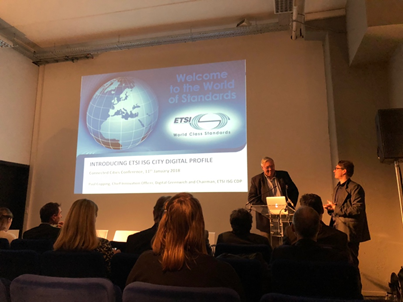The Communications Manager of World Cities, David Zeller, attended the Connected Smart Cities Conference 2018 in Brussels on 11 January. The conference was hosted by Open & Agile Smart Cities (OASC) at The EGG Brussels and contained a full day program with various topics related to the smart cities themes.
The main themes included: ecosystem innovation, internet of things, energy grids, smart homes, next generation internet, data protection, smart mobility and digital water.
Opening words of welcome were provided by OASC Chair, Martin Brynskov. The European Commissioner for Digital Economy and Society, Mariya Gabriel, sent a video greetings to the attending delegates.
Markku Markkula, First Vice-President of the European Committee of the Regions
Markku Markkula made the point that Connected Smart Cities become enablers of the change toward ecosystems. European partnerships are key instruments for bench-learning a scaling up new innovations.
Some recurring ideas centered around how to get beyond the challenge of cities tending in many cases to be silo organizations. The conference brought to light many common issues facing cities, in an attempt to allow open discussion, sharing of best practices and promoting potential collaboration between cities. This is in line with the purpose of World Cities, which is to strengthen market opportunities and job creation while pursuing the sustainable economic development of cities, fostering win-win cooperation.
The session on Data Protection dealt with privacy and sharing data. Risk management, cyber security, and issues on city vs. municipal level of data were discussed.

Anna Lisa Boni – Secretary General of Eurocities
Ecosystem Innovation resulted with three messages: “sharing is caring” with a common database and bridging the innovation gap, thinking about smart societies including in rural areas, and citizens are driving forces in the digitization process. The role of the different networks means we need accessible data and places to test tools, as in living labs.
Many issues regarding modernizing legislation to keep pace of the issues of privacy related to digitization were discussed. As for water, digitizing infrastructure, which is many cases over 100 years old, is needed to improve quality and quantity of water.
Digitalization, internet of things, and disruptive business, as pointed out in the conference, can lead to cities developing better services for citizens, more proactive and transparent administration, new and better opportunities. However, there are also many challenges to overcome, such as: new social divides, privacy and security risks, disruption of local commerce.
Paul Copping, ETSI and Martin Brynskov, OASC
A couple of hundred delegates were in attendance from all over the globe, including World Cities participants from Finland and the Republic of Korea. Seppo Haataja is Director of the OASC and chaired the session on Smart Mobility: Getting There. The session focused on how to transfer scalability and harmonization between the work being done in cities. In spite of many challenges, plentiful opportunities are available and can be developed.
Mr. Haataja is also Director of Smart City Development from Business Tampere and has been involved with the World Cities 2017-2018 programme, and met with delegates from Gwangju in Tempere from 29 November – 1 December 2017. On that occasion, he explained the role of the alliance in standardizing APIs & data models for cities worldwide. He showcased some concrete collaboration between cities through the EU project Synchronicity and invited Gwangju and further Korean cities to join the alliance, which is supported by the European Commission.
In attendance at the 11 January 2018 conference were also were Dr. Chi Hyung Lee, President of Seoul Digital Foundation, and Dr. Jung Woo Lee, Director of Seoul Digital Foundation. David Zeller arranged for meetings with Pablo Gándara, Director of World Cities, in Seoul during the following week. The Seoul Digital Foundation tackles urban issues with digital technologies. They make the most of Seoul’s highly ranked digital infrastructure to address issues related to technological advancement, and lead digital innovations for the Seoul Metropolitan Government.
Further discussions took place between David Zeller and Markku Markkula, First Vice-President of the European Committee of the Regions, in addition to Olavi Luotonen, Progam Officer Internet of Things for the Directorate-General for Communications Networks, Content and Technology, European Commission.
The results of the conference can be viewed on: https://www.youtube.com/watch?v=x3xD1eDfBNE&feature=youtu.be
The full conference program can be seen below:
PROGRAMME
09:00: Welcome: Dr. Martin Brynskov, Chair, Open & Agile Smart Cities
09:15 – 10:15: Opening Plenary Session
Moderator: Jarmo Eskelinen, CITO Future Cities Catapult, OASC co-founder
- Mariya Gabriel, Commissioner for Digital Economy and Society
- Markku Markkula, First Vice-President, Committee of the Regions
- Anna Lisa Boni, Secretary General, EUROCITIES
- Kees van der Klauw, chair, Alliance for IoT Innovation (AIOTI)
10:30 – 12:30 Parallel sessions 1
Ecosystem Innovation: Joining Excellence and Capacity Building (Room: Cinema)
Chairs: Zsuzsanna Bodi, ENoLL & Alain Heureux, Creative Ring
Speakers:
- Laurent Frideres, Head of Unit, Evidence & Outreach, ESPON
- Anna Ståhlbröst – Lulea University / Botnia Living Lab
- Rick Schager, City of Eindhoven
- Chi-Hyung Lee, President, Seoul Digital Foundation
- Mika Rantakokko, City of Oulu, Digital Transition Partnership
- Ingrid Willems, DataScout
IoT-Enabled Smart Cities Market Creation: Policy Issues and Open Calls (Room: Auditorium)
Chairs: Gemma Guilera, Future Cities Catapult & Davor Meersman, OASC
Speakers:
- Kim Brostrøm, DOLL Living Lab, Denmark
- Dana Eleftheriadou, DG GROW, European Commission
- Jung Woo Lee, Seoul Digital Foundation
- Nathan Pierce, Greater London Authority, Chair of the Board of Coordinators (EIP-SCC)
- Jon Kirkpatrick, Future Cities Catapult
Energy: Interoperable Smart Homes and Grids (Room: Riverside 3)
Chair: Keith Dickerson, Board member of ETSI; Head of ITU-T SG5 Working Party on ICT and Climate Change
Speakers:
- Rolf Riemenschneider, DG CONNECT IoT Unit, Head of Sector
- Natalie Samovich, Managing Director, ENERCOUTIM; H2020 VICINITY project
- Nikolaos Kontinakis, EUROCITIES, H2020 ESPRESSO project
Tech track: Platforms for IoT and Smart Cities & Communities: Towards Next Generation Internet (Room: Riverside 1)
Chairs: Carl Piva, TM Forum
Speakers:
- Boris van Hoytema, City of Amsterdam, The Foundation for Public Code
- Bo Fristed, CIO, Aarhus Municipality, Denmark
- Juanjo Hierro, CTO, FIWARE Foundation
- Juanjo Hierro on behalf of Martino Maggio, Senior Researcher Engineering Ingegneria Informatica/SynchroniCity
- John Davies, Chief Researcher, Future Business Technology, BT
- Rob van Kranenburg, Founder of IoT Council, Next Generation Internet
- Omar Elloumi, AIOTI Working Group on Smart Cities, Nokia
13:30 – 15:30 Parallel session 2
Data Protection: Securing Privacy while Enabling Innovation (Room: Riverside 1)
Chairs and Speakers: Sébastien Ziegler, President, IoT Forum, Mandat International & Hanna Niemi-Hugaerts, Forum Virium Helsinki
Additional Speakers:
- Jon Kirkpatrick, Head of Connected Cities, Future Cities Catapult
Smart Mobility: Getting there (Room: Auditorium)
Chairs: Seppo Haataja, OASC WG Mobility, Business Tampere & Piia Karjalainen, ERTICO, MaaS Alliance
Speakers:
- Francois Fischer, ERTICO
- Guido Dipasquale, UITP
- Nikolas Thomopoulos, University of Greenwich
- André Duarte, EMBERS project, Ubiwhere
- Olaf-Gerd Gemein, Smart City Lab
- Matteo Satta, Issy Media, City of Issy-les-Moulineaux
Natural Resources: Digital Water and Beyond (Room: Riverside 3)
Chairs and Speakers: Andrea Rubini, Scientific and Policy Manager, the European Water Platform WssTP & Jürgen Sturm, Texas Instruments, AIOTI Working Group on Water Management
Additional Speakers:
- Matevž Straus, City of Idrija
Tech track: Global Standards for IoT and Smart Cities & Communities (Room: Cinema)
Chairs: Martin Brynskov, OASC, Aarhus University & Nikolaos Kontinakis, EUROCITIES
Speakers:
- Christophe Colinet, EUROCITIES KSF Standards lead
- Lindsay Frost, ETSI ISG CIM / NEC Labs Europe
- Paul Copping, ETSI ISG CDP / Royal Borough of Greenwich, London
- Maria Poveda, Universidad de Politécnica de Madrid
- Bart de Lathouwer, OGC/ESPRESSO
- Georges Lobo, Policy Officer, Interoperability, DG DIGIT, European Commission
- Svetoslav Mihaylov, Policy Officer, Smart Mobility and living, DG CONNECT, European Commission
- Marco Carugi, ITU-T FG-DPM / NEC
16:00 – 17:00 Closing Plenary Session
Moderator: Jarmo Eskelinen, CITO Future Cities Catapult, OASC co-founder
- Results from the parallel sessions (Session Chairs)
- Mechthild Rohen, HoU IoT Unit, DG CONNECT
- Silke Obst, Member of the Cabinet of European Commissioner Violeta Bulc, DG MOVE, European Commission
- Mary-Ann Schreurs, Vice-Mayor, City of Eindhoven; Chair, EUROCITIES Knowledge Society Forum
- Martin Brynskov, Chair, OASC, Aarhus University


